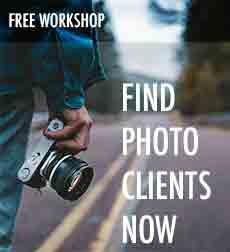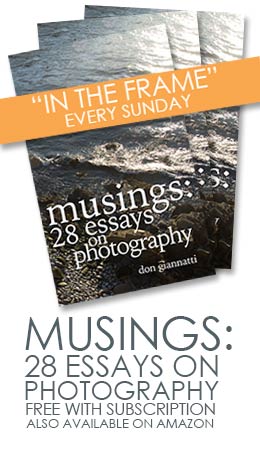… or a very very bad idea?
Trey Ratcliff (Lost in Customs) has always given his images away on the Non-Commercial Creative Commons License. What is new today is his link to grab ALL of his favorite 500 images for free and download them in full high res form.
See more here: Free Download: Trey Ratcliff’s 500 Best Photos in Full Resolution
This is the new paradigm of photography that wasn’t really around in the old days. There were professionals with very expensive and exotic gear and the rest of the world was happy with a point and shoot that took 2 rolls a year.
Now photography is ubiquitous. From cell phones to big DSLR’s more people are engaged than ever before.
This has created a new source for photographers to benefit from; the teaching of the amateur photographer who wants simply to be better at that activity.
When you think about it critically, it is just another source – a channel so to speak – of revenue. The vast majority of them do not wish to become ‘professionals’, they simply want to have fun, make cool imagery, and be a part of the rich heritage of photography.
Nothing wrong with that. Lots of people take piano lessons who do not have their eye on Carnegie Hall. Lots of people go to painting workshops to learn how to do their art without designs on the Met. Ballroom dancing, Yoga, creative writing, scrapbooking, running, Pilates…. the list is pretty long.
These people want to be better at something and there are professionals out there to help them become better.
Trey’s always given his images as CC Non-Commercial, so they are not really seen as commercial anyway. His main revenue source is the amateur photographer who wants to make a ‘cool’ HDR shot on vacation. He has, to my knowledge, never pretended to be something he is not (and there are plenty of those folks who do out there) but has always maintained his amateur status as teacher and photographic vagabond. Actions/Presets/Ebooks/workshops.
Professional photographers will someday realize that the amateur and advanced amateur is as viable a market as corporations and ad agencies. And this new market carries no guilt or ‘wannabee’ status at all. It is a person wanting to know ‘how you do that’ so they can do it too.
Is that ‘pure photography’?
I am not sure I even know what ‘pure photography’ is these days… in fact: We must understand that what was once a “photographer” is now a different categorical definition. Where once non-photographers maybe shot a roll or two per year, they now shoot tens of thousands of images per year.
His market is a great swath of people who love making photographs that please them, and their own audience. We can sit on high and pass judgement, but that is sort of like telling me that nobody likes Rap music because it takes little to no musical ability.
True on what it takes, wrong on who likes it.
Photography is now a ‘participation’ hobby, with a possible nod to sports. It is no longer in the confines of the ‘professional’ with lots of exotic gear and expensive tools. It is open to the masses and they are eating it up with gusto.
Photography is no longer a narrow niche. It is no longer in the purview of the professional. It will NEVER go back. Never.
Trey (and others in that genre) are not interested in shooting for corporations or ad agencies or for magazines, he is of a newer breed of photographer who recognizes a market and fills that market with educational tools and intellectual property that it craves.
Where once we had two channels – professional photographers / the rest of the world – we now have dozens or more.
Professional photographers.
Professional photographic educators.
Semi-professional artists, semi-professional consumer photographers.
Serious amateurs who devote tens of thousands of dollars to participate.
Instagrammers and Hipstagrammers and the companies that print books.
Blurb, Artifact Uprising, MILK and more
Wedding pros / wedding amateurs…
Vigorous amateur participation that brings BILLIONS into the genre.
Why we continue to find fault with this new and widely diverse new model simply stumps me.
Pianists teach people who do not want to be professionals.
Guitar and drums and trumpet and french horn teachers do the same.
There are painting and poetry and creative writing workshops and education for people who do not want to be professional, just better at what they love.
Universities keep turning out people with sociology degrees, and early french literature degrees, and philosophy degrees (and hundred thousand dollar debt) to people who will never be able to make a living with that information.
Why is it wrong, or somehow devastating to some, that a guy like Trey comes along and says.. “Hey, I have a different approach. I don’t want to make money from my photographs, I want to teach and help and be compensated for that.”
As far as I know, he has never offered anyone the “Tips to a Six Figure Business” or the “Seven Secrets Every Photographer Should Know”… He has a loyal and fairly deep fan base that loves what he does and compensates him for doing it.
That his business model seems to worry so many “professionals” is far more troubling to me. We better learn to embrace the change or we will all be old farts sitting around bitching while the youngsters spin circles around our tired asses.






How true, and Trey is a good example.
There is a huge market of professionals already who do the same. I have all of Kirk Tuck’s books for instance, and once met Joe McNally. Joe and David Hobby do give some lectures I think, but they are compensated by some companies as far as I know. Others like Thorsten Overgaard or Peter Turnley or Ming Thein – just to name a few – offer quite expensive workshops (and books and/or DVDs as well).
But none of the ones I know give away their images for free, CC-license them and offer them in full resolution like Trey. Maybe that’s why he’s the one whom I presented first on my newly built web site. I once had a permission from Kirk, but the thing is that you have to ask instead of just linking back and saying “thank you”. And even asking is no guarantee to being allowed to show the work of others: Thom Hogan for instance said “no”. Kindly, but still “no”. Which I can understand and have to respect as well of course.
My own photos are all CC-licensed, and also available in full resolution. I think I don’t take away any income from professionals with that – first, like Trey, I don’t sell my photos, and second: I’m simply not good enough except maybe on a stock photo level (which I also don’t offer, tho I was asked to do so by Getty). Plus going pro simply would take away the fun part for me, so count me into that piano learners group.
Always good to read your thoughts, so thanks for sharing them.
Oh – and I hope you’re back to your old and good health by now.
Cheers,
Wolfgang
I suspect that the serious amateur was always there, but the web just makes that obvious. I grew up in a pre-digital world, and everyone that I knew had thousands of photos in albums and shoe boxes, instead of on Instagram. We made prints in darkrooms in nearly every high school in the U.S., and maybe the rest of the industrial world too.
I feel uncomfortable with the term “photographer” because of all of the “you are not a photographer” whining out there. It really degrades the profession.
Your essay here is very professional. Thank you.